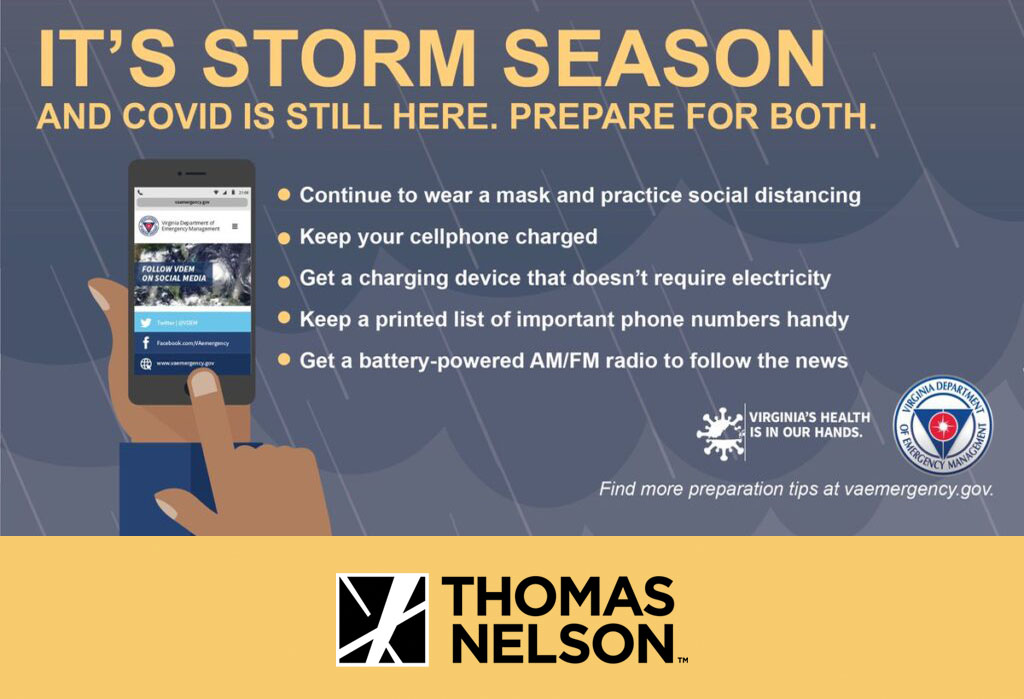Safety Officials Offer Tips for Severe Weather Prep

As the 2020 storm season continues through Nov. 30, Thomas Nelson safety officials encourage everyone to remain diligent about preparedness. Important steps taken ahead of severe weather can significantly impact response and recovery efforts.
Start by identifying your personal risks such as location of your residence (flood zone, etc.); type of insurance coverage (homeowners and flood); whether or not you have a plan; your evacuation route; if you Know Your Zone; and also where and how will you obtain information.
Your emergency plan should address the risks and requirements of staying versus evacuating. Make sure everyone in your household understands your emergency plan. Discuss the latest CDC guidance on COVID-19 and how it may affect planning. Also, remember to create a plan for the office, children's daycare and anywhere you frequent.
Useful planning tips:
- Include plans for functional and social support services
- Include plans for pets and their supplies, if your local shelter does not accept pets, or certain types of pets only
- Prepare an emergency kit and supplies that can sustain self-sufficiency for three to seven days or more including food, water, blankets, fuel, medicines, medical supplies, pet supplies, and etc.
- Prepare to store all items that may become projectiles due to high winds such as trashcans, recycle bins, patio furniture, and any yard debris
- Adhere to all recommendations for evaluation or shelter-in-place advisories from your local officials
- Determine if your residence can withstand hurricane-force winds, if you plan to shelter in place
- Evacuate as advised, if you reside in a mobile home or are camping in an RV
- Make sure you have a battery-powered NOAA weather radio. A NOAA weather radio will allow you to monitor the weather and receive messages about public safety
- Anticipate an interruption in government services, retail and other businesses
- Anticipate the loss of human services, financial services and the ability to obtain cash
- Anticipate damages and loss of utilities
- Expect significant delays in emergency services responses, if they can respond at all. Typically, emergency services stop responding when conditions become unsafe to do so. Following a storm, damage can prevent emergency services from reaching many areas for hours, days or even weeks.
It's also wise to review your insurance coverage. Does your coverage match or exceed your assessment? Know your deductibles, coverage limits and policy declarations. Most homeowners' policies do not provide for water, sewer or flood damage claims. Homeowners should consider purchasing flood insurance and consult an insurance agent or contact the National Flood Insurance Program. Renters should consider renter's insurance with water damage coverage. It can take up to 30 days for flood insurance to take effect.
With more than 1.25 million residents in 23 localities within Virginia's tiered evacuation zones, it's important to Know Your Zone. Designated A through D, the zones aim to give residents clear and specific evacuation or shelter-in-place information. When a serious storm is expected to threaten or is anticipated to impact Virginia's coastal regions, emergency management officials will collaborate to release information through multiple media including social media.
To aid in your severe weather preparedness efforts, here's a helpful resource from the Virginia Department of Emergency Management - the Virginia Hurricane Evacuation Guide. The guide emphasizes managing during the pandemic.
